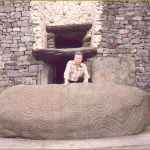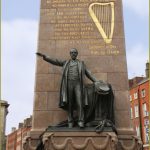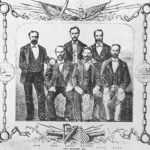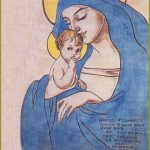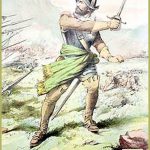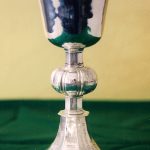Before the Civil War, the 69th NY State Militia regiment was commanded by Sligo-born Michael Corcoran. On November 15 1860, he was arrested for refusing to parade the 69th before the visiting Prince of Wales. Less than two months later, on January 9, 1861 Fort Sumter was fired on and everything changed. The commander of the artillery battery that opened fire on Fort Sumter was Capt. John Mitchel, who had escaped from Van Dieman’s Land with his father, Irish patriot John Mitchel. After the surrender of the fort, Mitchel allowed defending Major Anderson a cannon-salute to their flag in … [Read more...] about The Bloody Shamrock
Flag Day
June 14th is a special day for us in America. It is a day set aside to honor our national emblem - the stars and stripes. It is flag day, a day when we should all be flying our flag, but just why is it flag day, what does it mean, and what is our flag anyway that it should have a day of its own. What is our flag? Well, when you describe it in terms of material, it is only a piece of cloth, dyed with a little blue and red that makes a design which is the symbol of the United States. And that may be all that it is to some; to those who show it no respect, to those who make clothing from it, to … [Read more...] about Flag Day
Corned Beef and Cabbage
With the recent St. Patrick’s festivities behind us, I can’t count the number of times I was told Corned Beef and Cabbage is not an Irish dish as if we who enjoyed it were being duped by store managers with an abundance of the stuff. I enjoyed telling them the truth only to see their eyes open wide and to know that the nex time they have it, they’ll think of us. In the Nineteenth century, the Irish tenant farmer had been forced to rely on potatoes as a main food since it produced the greatest yield per acre and most of the land belonged to English landlords. On special occasions one might … [Read more...] about Corned Beef and Cabbage
St. Patrick IS a Saint!
Would you ever get up to sing a song if you didn’t know the words? Some people do when they’re drunk! Would you ever repeat a rumor if you didn’t know it was true? Some political spin doctors do to improve their candidate’s position! Would you ever report something as fact if you didn’t know what you were talking about? Some fools do to create a reaction or enhance their name! The saddest part is that if they repeat a falsehood loud enough, often enough and from a legitimate platform, like a credible newspaper, there are those who will believe it and carry it further; these are the ones … [Read more...] about St. Patrick IS a Saint!
Sir Roger Casement Comes Home
Roger Casement was born in Antrim on September 1, 1864 to a Protestant father and a Catholic mother. At 17, he went to work for the Elder Dempster Shipping Company in Liverpool. Three years later he was sent to west Africa where he joined the British Colonial Service and was gradually advanced to a position in the British Consulate there. Always a fair and honorable man, he was horrified at the inhuman treatment of native workers in the Congo, and wrote a report exposing those conditions. The story was published, and when Casement returned to England in 1904 he was applauded for his … [Read more...] about Sir Roger Casement Comes Home
BEAN na hEIREANN
On January 28, 1967, Helena Moloney died in Dublin. Moloney was a great woman, born in Dublin in 1884, as a teen, she was deeply moved by a speech given by Maud Gonne and decided to join Inghinidhe na hÉireann (the Daughters of Ireland) a revolutionary women's society founded by Maud Gonne on Easter Sunday 1900. She went to Maud Gonne’s house to join up and arrived in the middle of a police raid. Asked by the police if she was a member, she replied that she was and was proud to be, whereupon she was promptly arrested. From the beginning, Helena played a prominent role in the organization … [Read more...] about BEAN na hEIREANN
Three Ancient Observatories
The Boyne Valley, some 20 miles northwest of Dublin in County Meath, is one of the most remarkable sites on the planet, for there stands three monuments to the early settlers of Ireland, and their civilization. At first they appear to be huge mounds or hills, but closer investigation reveals them to be man-made structures. They are, in fact, more than 5000 years old and the oldest, still-standing, man-made structures on the planet. They are known as Newgrange, Knowth and Dowth and a celestial manifestation occurs there each December. The oldest mound, Newgrange, is about 262 feet in … [Read more...] about Three Ancient Observatories
James Stephens
At midnight on the rainy night of November 24, 1865, there was hardly a soul to be seen on the streets of Dublin. Policemen on duty took shelter in doorways, blowing on their fingers to warm them in the bitter cold. Not far away and colder than the policemen six men, soaked to the skin, were waiting outside Richmond Prison. When they spoke, they spoke in whispers and watched the high wall of the prison for a signal. In a cell within the prison, a man paced back and forth. He too awaited a signal for he knew, that unless plans miscarried, this was the night he was to be rescued. His name … [Read more...] about James Stephens
Charles Stewart Parnell
Charles Stewart Parnell, a Protestant Squire in Avondale in Co. Wicklow, was the son of an English father and an American mother. The maternal grandfather for whom he was named was Charles Stewart: Commanding Officer of U.S.S. Constitution (Old Ironsides) during the War of 1812; the U.S. Navy's first Rear Admiral (an appointment made by President Lincoln in 1862); and a genuine hero. On February 20 1815, with a strategy described by James Fenimore Cooper as, the most brilliant maneuvering in naval annals, Stewart, heavily outmanned and outgunned, soundly defeated and captured two British ships … [Read more...] about Charles Stewart Parnell
The Irish in Labor
In 1913, John Murphy fired all his employees who had joined the Irish Transport and General Worker's Union led by James Larkin and James Connolly and urged other Dublin employers to follow suit. Larkin and Connolly knew this lockout was a death threat against the Union, so they led the workers in a general strike signaled by the walkout of the Tram workers at 10 AM on August 26. It was a daring move for, although labor unions were not new, they had never succeeded in Ireland where government troops often supported employers. It is ironic that 33 years earlier the Land League had introduced … [Read more...] about The Irish in Labor
The Catalpa Rescue
In 1858, the Fenian brotherhood was founded in America and the Irish Republican Brotherhood (IRB) in Ireland to work for Irish independence. Britain declared membership in that organization a crime punishable by deportation to her penal colony in Freemantle, Australia. Seldom in history can one find a story to rival the adventure that brought embarrassment to England and freedom to six Fenians who had been sentenced to that harsh penal colony for life. It all began in 1871, when John Devoy, Jeremiah O'Donovan Rossa, and other Fenians were released from prison in England on a general amnesty … [Read more...] about The Catalpa Rescue
A Heroe in Three Lands
In 1823, a boy was born who became a hero to three lands: Ireland, Australia, and the United States. His grandfather's successful trading business made it easy for his father to own a small hotel and pub in County Waterford, where, on August 3,Thomas Francis Meagher was born. Young Tom was educated at a Jesuit boarding school, and later at a Jesuit college in England where he earned a reputation as an effective orator. He returned to Ireland in 1843, just two years before the Great Hunger, and saw his countrymen starve while the landlord's crops grew in abundance for export. Infuriated, he … [Read more...] about A Heroe in Three Lands
A Little Green in the Red, White and Blue
June 14 is a special day for America and especially for the Irish in America. It is a day set aside to honor our national emblem - the stars and stripes. June 14 is flag day, a day when we should all be flying our flag in honor. Why is it flag day, what does it mean, and what is our flag anyway that it should have a day of its own? When you describe it in terms of material, it is only a piece of cloth, dyed with a little blue and red that makes a design symbolizes the United States. And that may be all that it is to some; to those who show it no respect, to those who make clothing from … [Read more...] about A Little Green in the Red, White and Blue
The Confederation of Kilkenny
An organized colonization of Ulster by settlers from England and Scotland began in 1609 under King James I. Half a million acres in Ulster were confiscated and given to colonists who had to be English-speaking Protestants and agree to dispossess the native Irish. Later, in 1638, a group of Scottish Presbyterians signed a covenant to maintain the Protestant Reformation and the anti-Catholic rhetoric of these ‘Covenanters’ led James’ successor, Charles I, to threaten them with an army of Irish Catholics. The Scottish Parliament, in turn, threatened to invade Ireland to achieve the extirpation … [Read more...] about The Confederation of Kilkenny
James Connolly – The Athlete
When the name of James Connolly is mentioned, most immediately think of Ireland’s great patriot and labor leader who was brutally murdered by the Brits in 1916 after the Easter Rising. He was born in poverty to Irish parents in Edinburgh, Scotland on June 5, 1868; but there was another James Connolly, also born in poverty to Irish parents in 1868. This was James Brendan Connolly, born in south Boston, MA. Curiously, the month of April was most significant for both. For our Irish patriot, it was the month he led his followers in the great uprising that was to become the watershed in Irish … [Read more...] about James Connolly – The Athlete
A Promise Fulfilled
Frank Stagg, of County Mayo, came from a long line of Irish patriots. His father had fought in both the War of Independence and the Civil War. In the 1970s, Frank emigrated to England, where he worked as a bus conductor in North London. He joined Sinn Féin in 1972 and shortly thereafter joined the IRA. In April 1973, he was arrested in Coventry and, under archaic Conspiracy Laws used to convict IRA members when there was a lack of hard evidence, Frank Stagg, Father Patrick Fell, and five others were convicted of conspiracy to commit arson and given 10-year sentences. Taken to Albany … [Read more...] about A Promise Fulfilled
Father Tom O'Reilly
A recent trip to Atlanta provided an opportunity to meet Father Thomas O’Reilly – figuratively, of course, – since Father Tom passed away back in 1872. Yet, as recently as March 2007 he was honored with the City of Atlanta’s Phoenix Award in appreciation of his heroism and outstanding contributions to the City and citizens of Atlanta. It simply just begged the question: who was this remarkable man? Born in Drumgora, Co. Cavan, in 1831, Thomas O’Reilly graduated All Hallows seminary in Dublin and was sent to the American south as a missionary priest in the area of Atlanta where Masses were … [Read more...] about Father Tom O'Reilly
The Original Kilmainham Madonna
One of Nationalist Ireland’s most unique emotional treasures has been found, but as yet has not been seen by those who revere it most. The ironic part of the story is that many people never knew it was missing, and here’s why. Joseph Mary Plunkett was one of the most beloved and charismatic of all the leaders of the 1916 Easter Rising. A deeply religious individual, as evidenced by his middle name in honor of the Mother of God, he came from the same family that had given St. Oliver Plunkett as a martyr to the Church. A youth of frail health, he grew into a sickly manhood, though his heart … [Read more...] about The Original Kilmainham Madonna
Owen Roe O'Neill
The 17th century dawned in Ireland during the 9-years war of the three Hughs against the Crown, but by the end of 1607 Ireland was leaderless; the Clan system was overthrown, the great Gaelic Houses were destroyed, and a strong foreign power was in possession of the land. The remaining Gaelic royalty had fled in the Flight of the Earls. The conquest of Ireland was complete; or so it seemed. Beneath it all, outlawed poets taught in hedge schools; Priests said mass on rocks in the glens; and the Bards kept the history alive in song and verse. After the Flight of the Earls, James I declared … [Read more...] about Owen Roe O'Neill
A Priceless Relic of Faith and Determination
It was a time of repression, a time of peril, a time of terror. It was the year 1640, and the place was Ireland. At that time and place, to be Irish and Catholic was to be an outcast in one’s own country. It began when the Normans came as conquerors in 1170. After initial settlements, the visitors were absorbed; they dressed Irish, spoke Irish, married Irish and adopted Irish laws and customs. To the crown this was a threat to their dominance and in 1366, the Statutes of Kilkenny were passed forbidding Normans to adopt Irish ways. It was the first of many laws passed to distinguish the … [Read more...] about A Priceless Relic of Faith and Determination
